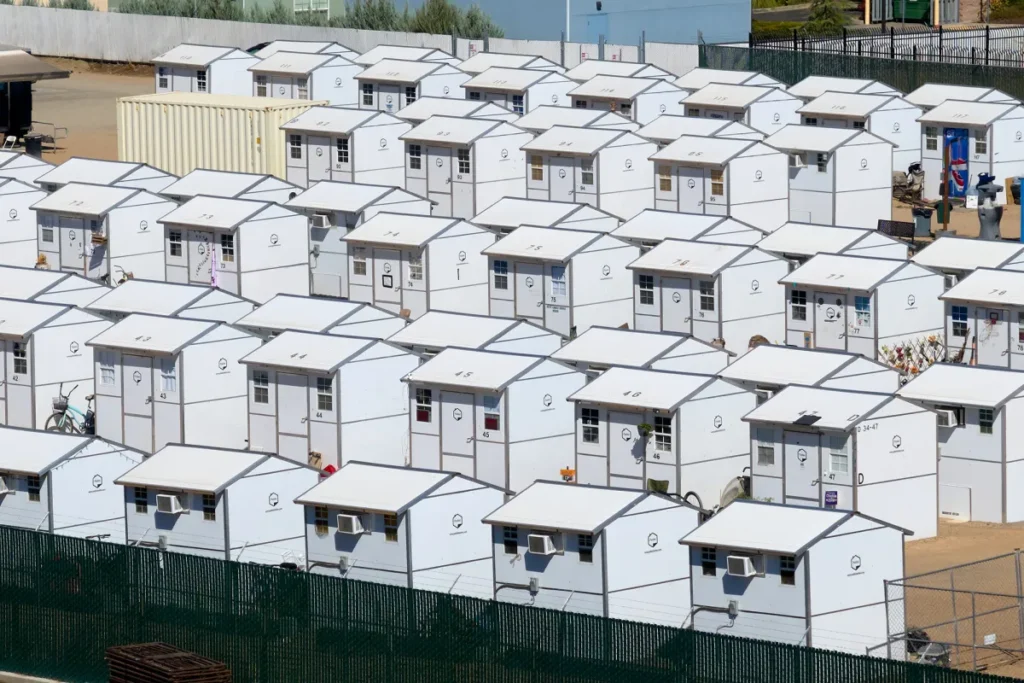The U.S. Department of Housing and Urban Development (HUD) has made $175 million in funding—the first of its kind—available for the purchase, construction, or renovation of permanent supportive housing. The Continuum of Care (CoC) program’s one-time awards under the CoCBuilds Notice of Funding Opportunity (NOFO) will allow communities to construct additional rental housing units with supportive services for those facing homelessness.
This NOFO sets aside $65 million for CoCs that are located in states with fewer than 2.5 million residents, ensuring that financing will benefit towns of varied demographics and populations. Nov. 21, 2024 is the deadline for applications.
In permanent supportive housing (PSH), which is rental housing with no time limit and supportive services available, homeless people with disabilities and their families can live independently if at least one member of the household has a disability. PSH improves results for both individuals and communities by addressing the root causes of homelessness as well as the urgent need for housing.
“When we have a safe, stable place to call home, we’re able to focus on our health, our families, and our communities. For our neighbors experiencing homelessness, especially those living with disabilities, this funding will provide access to affordable housing and lifesaving services,” said Principal Deputy Assistant Secretary for Community Planning and Development Marion McFadden. “The CoCBuilds competition further advances the Administration’s commitment to boosting housing supply and ensuring homelessness is rare, brief, and non-recurring.”
In order to maximize the quantity of housing available to meet the needs of individuals and families experiencing homelessness, HUD is encouraging CoCs to combine funds awarded for the construction, acquisition, or rehabilitation of new PSH units with other funding sources through the CoCBuilds initiative. Up to 20% of each grant may be applied to additional qualifying CoC Program activities related to PSH projects, such as running costs and supportive services—expenses that are renewable—in addition to financing the establishment of new units.
To support the housing needs of tribal communities, the CoCBuilds NOFO provides incentives for funding projects in partnership with Indian Tribes and Tribally Designated Housing Entities (TDHEs).
Permanent supportive housing is a beneficial strategy in addressing homelessness for several reasons.
- Stability: It provides stable housing for individuals who may otherwise be experiencing homelessness or precariously housed, offering a foundation for stability in their lives.
- Support Services: It offers on-site or readily accessible, voluntary support services such as counseling, healthcare, substance abuse treatment, and job training, tailored to the individual’s needs.
- Cost-Effectiveness: It can reduce overall public costs by decreasing the use of emergency services, such as hospitals, shelters, and law enforcement, which are often utilized at higher rates by individuals experiencing homelessness.
- Improved Health Outcomes: Stable housing contributes to better physical and mental health outcomes for residents, as they have a safe and consistent environment in which to address health issues and access regular care.
- Community Integration: Permanent supportive housing allows individuals to become integrated into their communities, fostering a sense of belonging and social connection, which are crucial for overall well-being.
- Prevention of Recidivism: For individuals who have experienced incarceration or cycles of homelessness, permanent supportive housing can break these cycles by providing a stable environment and support systems to prevent relapse into previous patterns.
In order to guarantee a holistic strategy, candidates are anticipated to collaborate with housing, health, and service organizations to guarantee entry to public and supportive services while augmenting the availability of affordable homes in the community.
The historic housing and homelessness initiatives made by the Biden-Harris administration are expanded upon by the CoCBuilds project. Through the HOME-ARP initiative, the American Rescue Plan contributed nearly $5 billion to the development of non-congregate shelters, new rental housing, rental assistance, and supportive services for individuals who were suffering or at danger of homelessness. HUD funded almost 7,000 projects nationwide with about $3.16 billion in Continuum of Care funds earlier this year through the annual competition.
The Biden-Harris Administration has prioritized new resources and initiatives to assist localities in promptly reuniting homeless individuals with housing, addressing the nation’s homelessness epidemic with the urgency it demands from the outset. HUD continues to be dedicated to the following policy priorities: providing more affordable housing; emphasizing racial fairness and anti-discrimination laws for LGBTQ+ people; including those who have experienced homelessness in the decision-making process; and eradicating homelessness for all people.
To read the full release and more information, click here.






